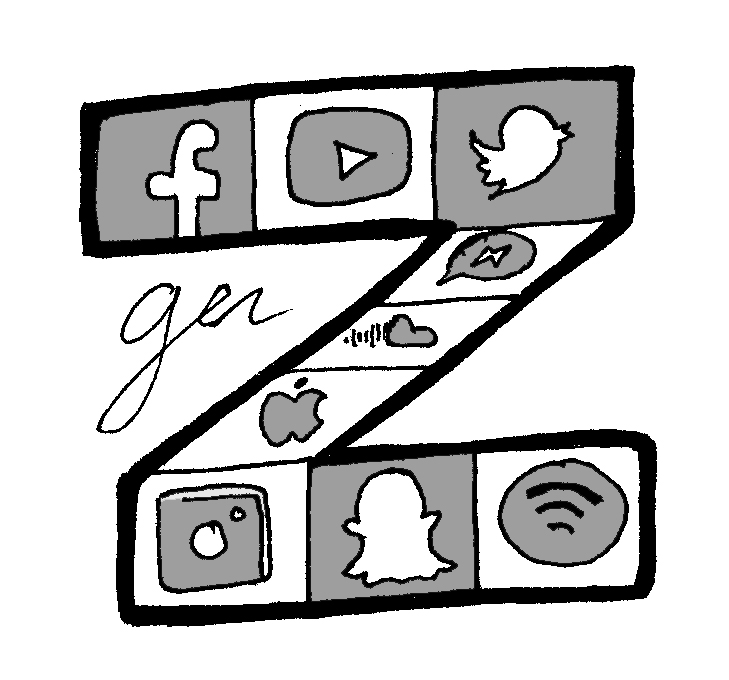On the optimism of Generation Z
October 4, 2019
 This
piece represents the opinion of the author
.
This
piece represents the opinion of the author
.
 Shona Ortiz
Shona OrtizThe first few essays from the Fox Box will be a deep dive into the particulars of what makes Gen Z different: Who are we as consumers? As activists? What do we care about and how will we shape the world to come? In this column, I hope to draw from analytics and research, as well as interviews and anecdotes to probe the soul of who we are as a demographic cohort.
Because the kind of internet we use today was designed by Millennials for Millennials, Gen Z—those born between the mid-1990s and early 2000s—often get mistakenly clumped into their demographic cohort. The purpose of this column is to assert the opposite: that Gen Z is unique and actually more optimistic than our predecessors for several reasons.
My sister and I are both Gen Z, babies of internet 2.0 (the highspeed, semantic systems web). She is 17 and I am 20. The web shapes not only how we communicate and stay in touch, but also the nature of the relationship itself. The late nights we spend on our living room couch, each on our respective devices sending each other memes, are actually how we spend many of our most intimate moments. We relate to each other through images and the immediacy of information and connection. And when an image doesn’t send in a millisecond we act as if the world owes us something. My father can easily recall a time when a PNG file took a day and a half to load.
The way my sister and I use the internet has been bemoaned since we were children by our parents and by virtually every Gen X (born between within 1965 to 1980) outsider looking in. To our parents and grandparents we are apathetic, politically unengaged, distracted, screen whores, “more disconnected than ever” and the most ADHD generation in history. Much of their criticism makes sense as our parents were raised out of the context of meritocratic capitalism and political transformation.
Outcry from Gen X is nothing unfamiliar, especially not for Millennials who are labeled as hopelessly entitled and endeavoring for instant gratification and recognition. Born on the cusp of the internet from the 1980s to the mid-1990s, Millenials can remember seriously using things like VCRs and MySpace and inventing things like Facebook and Netflix. Millennials are seen in the workforce as being flexible, collaborative and valuing work/life balance. They denounce the kind of corporate drudgery their parents went through and as a result, seek jobs that drive their interests instead of careers.
Our context as Gen Z is somewhat different. Millennials were raised in the context of economic prosperity and a transitional period of barely any internet to the exponentially smarter and infinitely connected internet we currently use. By contrast, members of Gen Z are true digital and smartphone natives. Social internet networks and the “multiple realities” and identities that the internet harbors have defined our behaviors and our search for truth from a critical age. While we are arguably less self-oriented or entrepreneurial than Millenials, we are communaholic-realists facing larger existential threats like irreversible debt and financial burden, climate change, and political disunity and unrest. As climate change activist Nadia Navar puts candidly, “We’re the first generation that’s being significantly affected by climate change, and the last generation that can do something about it.”
A recent study from McKinsey & Company says that as consumers we value “uniqueness” and “ethics” while our parents consumed with a bend toward luxury items and brands. McKinsey characterizes our behavior as “unidentified id,” (seeking user unidentifiable platforms such as Snapchat) “communaholic,” “dialoguer” and “realistic.” The underpinning trait, above all, centers around a search for truth: expressing individual truth, connecting through different truths, understanding different truths and unveiling the truth behind all things. As a result, we are more willing to join someone who thinks differently if there is a shared cause and we are more likely to stop buying from brands that aren’t woke by our standards.
Though young, the leading edge of our generation already defines themselves as do-gooders and activists. A Pakistani teen, Malala Yousafzai, became the youngest person ever to win the Nobel Peace Prize in 2014 at age 18. A study by cultural forecasting firm Sparks and Honey found that 26 percent of 16 to 19-year olds volunteer on a regular basis and 76 percent are concerned about humanity’s impact on the earth. And for some reason, even though we are consistently defined as the “realist” generation, results from polls conducted by Heartland Monitor Polls showed that we (by an overwhelming amount) find “enjoyment” and “ability to make a difference” more important than money and skills when it comes to finding a job. As we age and rise to greater influence, it will be fascinating to see how these demographic temperaments reflect outwards in structuring society.
Today, 25 percent of Americans are Gen Z, between the ages of 4 and 24 years old, which will be decidedly the largest consumer and voter base. What do we demand of the world and of each other? How will we engage with our political economy and with our identity to shape a better world for our offspring than the one created for us? I invite you to consider these questions with me and decide where you lie. It is important because our next generation depends on it. Because you depend on it.
Jared Foxhall is a member of the Class of 2022.

Comments
Before submitting a comment, please review our comment policy. Some key points from the policy: